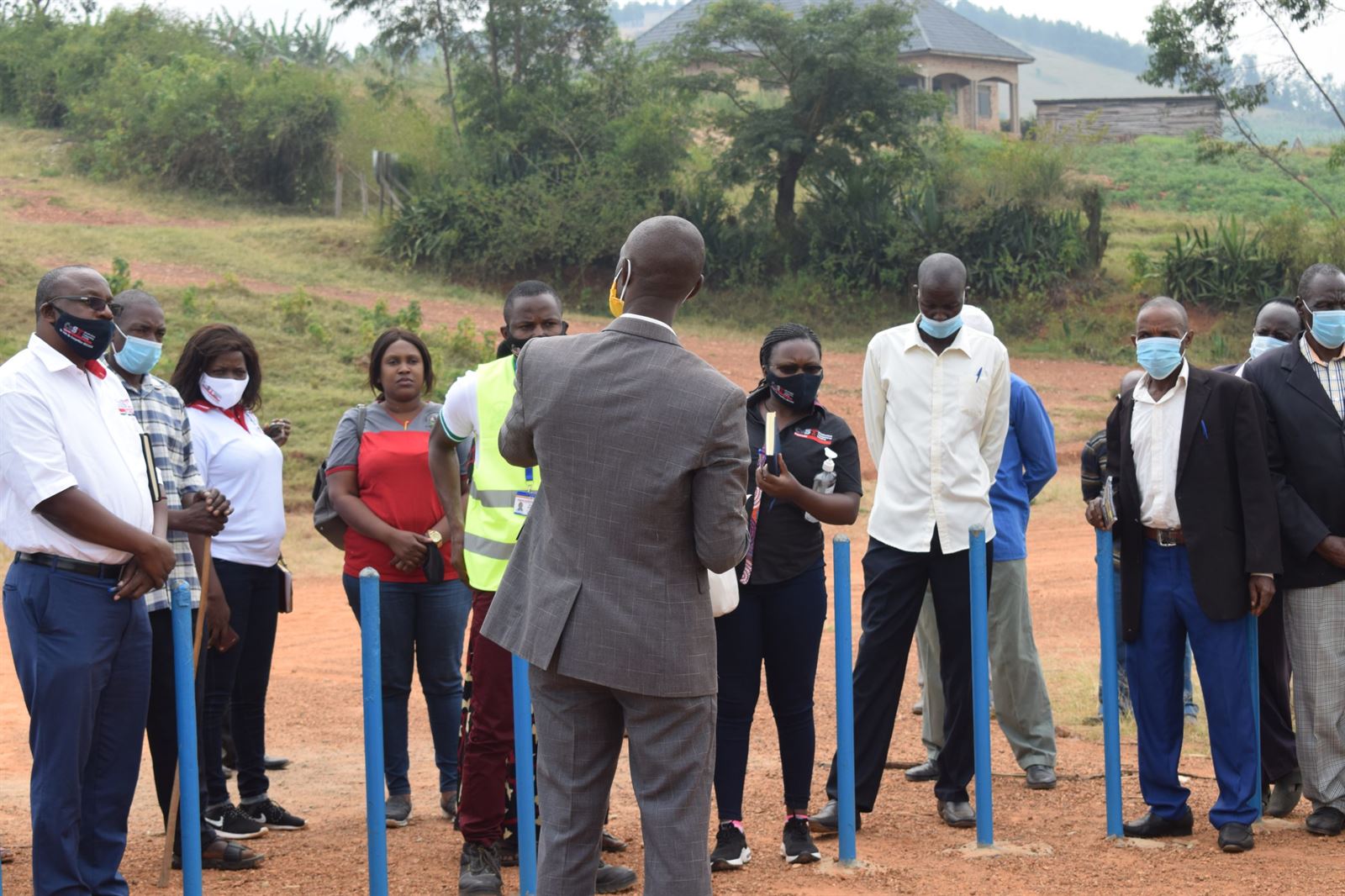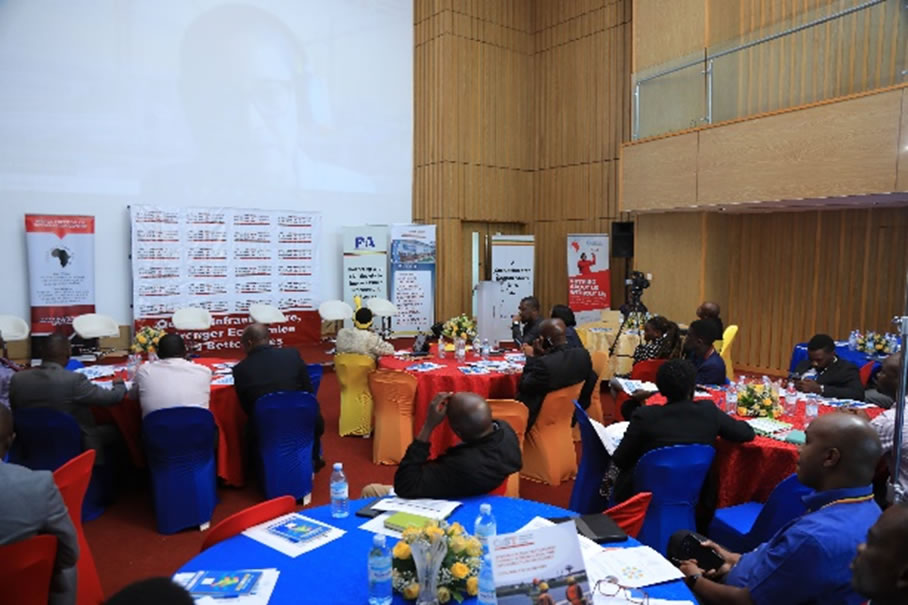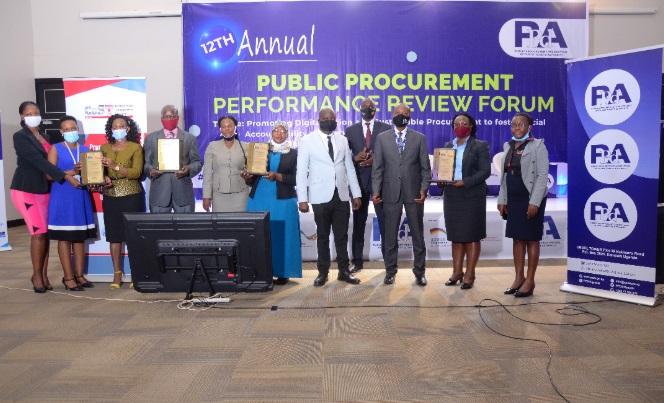
Over the last five years, CoST Uganda has been keen to document some of our experiences and results. Below is an outline of some of our work.
Key activities and stakeholders
Our interventions are focused at the national, regional and community levels and are built on the CoST International core features of Disclosure, Assurance, Multi-Stakeholder working and Social Accountability. CoST work takes the multi-stakeholder or collective approach including Government, Private Sector and Civil Society. The approach provides for evidence based research and advocacy, citizen engagement, media engagement, dialogue to enhance trust building, capacity enhancement and awareness raising through media and community Barazas held virtually and physically alongside infrastructure projects.
Our key stakeholders include government, private sector/businesses and the civil society/citizens. The government benefits from better management of public infrastructure projects, including a much larger pool of bidders and more competitive prices. Businesses benefit from an improved investment climate and level playing field. Whereas, Citizens benefit from better value for money, better quality infrastructure and greater trust in both government and the private sector.
CoST Uganda undertakes Assurance processes which is an independent study on selected infrastructure projects measuring key performance indicators, to date, 59 projects have been assured across nine high spend[1] entities. Supports the government and public entities in enhancing disclosure through alignment of information platforms, such as the Government Procurement Portal (GPP) and development of user friendly information platforms such as the Infrastructure Transparency Index (ITI) and Infrastructure Monitoring Tool which has been adopted by CoST International to promote social accountability across all programmes. CoST Uganda influences policy reforms and practice on good practices for improving transparency and accountability in the sector through carefully documenting our impact. To promote data use, CoST Uganda trains public officials, Civil Society, citizens and the media journalist’s webinars and media interfaces, and tracks performance through documenting how much our work has been published for example, the BII action appeared in 52 publications in 2020 and appeared in over 75 publications in the year 2021. Holds high-level events on key sector issues, documents key issues in the sector through reports.
Results
During the fair business practices discussions, and resulting from a study on factors affecting private sector participation in public infrastructure procurement processes in Uganda, the following issues were highlighted; low disclosure and lack of compliance with international disclosure standards such as the Open Contracting for Infrastructure Data Standard (OC4IDS), unfavorable procurement laws, which are perceived as not enabling local firms but instead favoring the “big boys” in the sector who are predominantly resident or foreign contractors and not locally originated providers/firms. Additional issues included; attitude issues (mindset) , inadequate market assessment, inadequate capacity building of local contractors to write winning proposals, low thresholds for infrastructure projects, conflict of interest at tender and approval stages, lack of sanctions to Procuring and Disposing Entities (PDEs) who fail to adhere to the guidelines/policies, inadequate implementation of reservation schemes and local content, lack of guidelines on manufactured products, corruption and bribes among others. CoST Uganda made recommendations the Public Procurement and Disposal of public assets Authority (PPDA), Ministry of Finance, Planning and Economic Development (MoFPED) and the Ministry of Works and Transport (MoWT) as well as civil society to address these shortcomings, the following actions were made;
- Increased transparency. During the collective action project, we achieved a huge jump in data disclosure on infrastructure projects. The contract value of disclosed data went from around UGX 0.4 trillion (USD 109 million) in the financial year 2018–19 to nearly UGX 2.4 trillion (USD 653 million) in 2019–20. Government incorporated the OC4IDS/IDS into the Government Procurement Portal (GPP) and Electronic Government Procurement Portal (E-GP) to standardize and increase disclosure of information and business opportunities. Over the last two years, disclosure increased from 43% in 2020 to 62% in 2021. Although, the assurance processes consider different projects in each process, the results from the assessments reveal a growing culture of transparency across the entities, entities attach a high level of credibility to the assurance results.
- Increased competition and a level playing field for businesses. Construction companies in Uganda increasingly see that business integrity is beneficial for all and can actually save them money. Business leaders used to see bribes as an opportunity to engage in tenders. They said things like “a bribe helps to get things done”. Yet at the same time, everyone was frustrated at being forced to bribe. There’s only so much you can milk a cow! Through our discussion, business leaders realised that; others were struggling with the same issues, corruption undermines a healthy and sustainable business climate, increased disclosure according to the CoST standards could provide equal access to information to all bidders; and that, access to information helps improve the level playing field and therefore, they had a duty to engage with integrity. Progressively, we observed an increase in the number of bids per tender from 1.6 to 12.5.
- A robust and transparent platform for dialogue between government and business has grown up. Businesses have been empowered to engage and influence reforms. We have observed a growing level of trust between the private sector and business with the Government, and more so, the trust that Government systems actually work. For instance, following the launch of the 4th Assurance report, and a private sector forum Uganda National Association of Building and Civil Engineering Contractors (UNABCEC) and Uganda Association of Consulting Engineers (UACE) as lead associations for contractors and consulting engineers respectively regained the trust to engage government (Parliament, PPDA and MoFPED) on the barriers to their effective engagement in public procurement, UNABCEC was later engaged to make reviews on the amended local content regulations, and both associations have since been highly regarded by the line Ministry of Works and Transport.
- Improved legal and policy framework for transparency and accountability in public procurement. PPDA revised guidelines for local governments for direct procurements to incorporate key provisions such as environmental, health and safety, joint ventures among others; Adopted a rewarding process for most transparent entities, as an incentive for disclosure by Procurement Entities, reviewed the bidding documents to include consideration on women and young people, health, safety and environmental safeguards. And provision for participation/consultations between central and Local Governments on centrally procured infrastructure projects; developed guidelines for emergency procurements. Strengthened its capacity building of public officials on disclosure to focus on infrastructure projects and awareness raising on procurement processes among others.
- Strengthened government policy on private sector and citizen participation. MoFPED considered CoST Uganda as part of various committees such as the Methodology for Assessment of the Public Procurement System (MAPs) where recommendations from the Business Integrity Initiative were included in the MAPs report and the CoST Standard (OC4IDS) recognized and adopted for improving disclosure, turning of reservation schemes into regulations and reviews of the local content thresholds, participation on committees on integrity issues in public procurement and sustainable procurement where transparency and accountability have been highlighted as key facets for clean and inclusive procurement.
- Clear improvement in trust in the procurement processes and partnerships amongst business, government and CSOs. Trust is hard to measure in statistics, but we can for example point at the increase in bids for tenders. Procurement agencies told us they used to struggle to get even the minimum number of three businesses bidding for contracts. Without confidence in the system, nobody engages. Information sessions on specific tenders helped to build trust, along with increased disclosure. Now bidders are banging at the doors. From an average of only 1.6 bidders per tender in 2019, this has risen to an average of 12.5 bids per tender in 2020 – a huge improvement in competition that should result in better outcomes for citizens.
[1] Wakiso District, Ministry of Education and Sports, Ministry of Health, Kampala Capital City Authority, Uganda National Roads Authority, Ministry of Water and Environment, Ministry of Energy and Mineral Development, Makindye Sabagabo Municipality, Ministry of Works and Transport.



